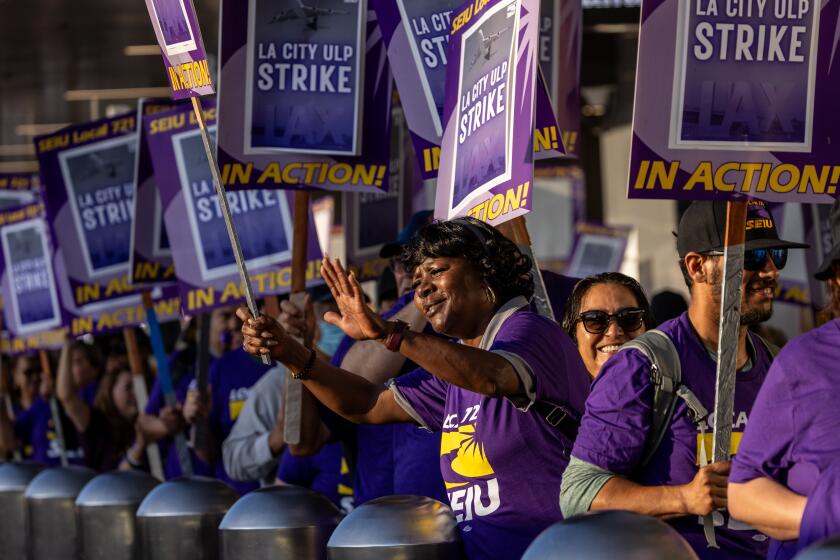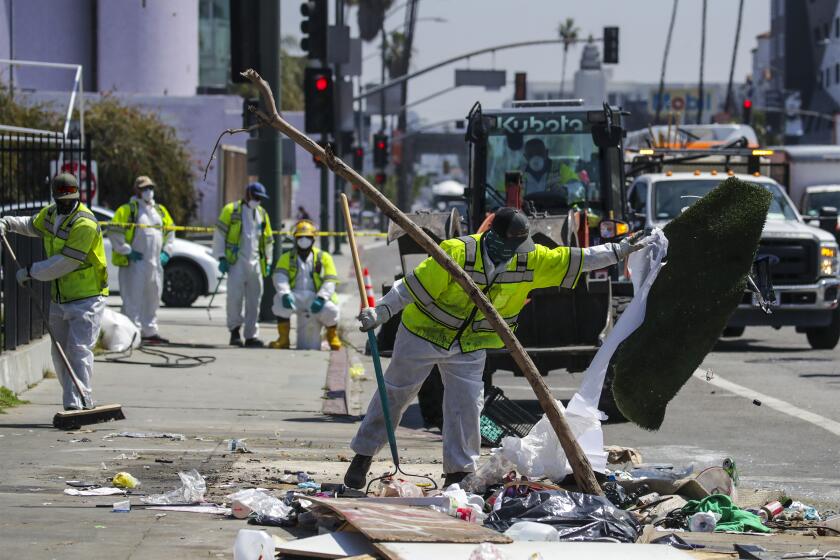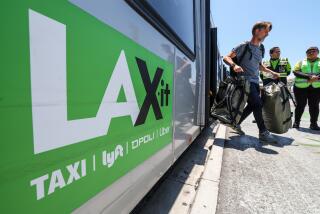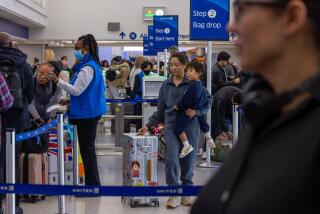‘More work for less money’: Protests at LAX, City Hall as thousands walk off the job
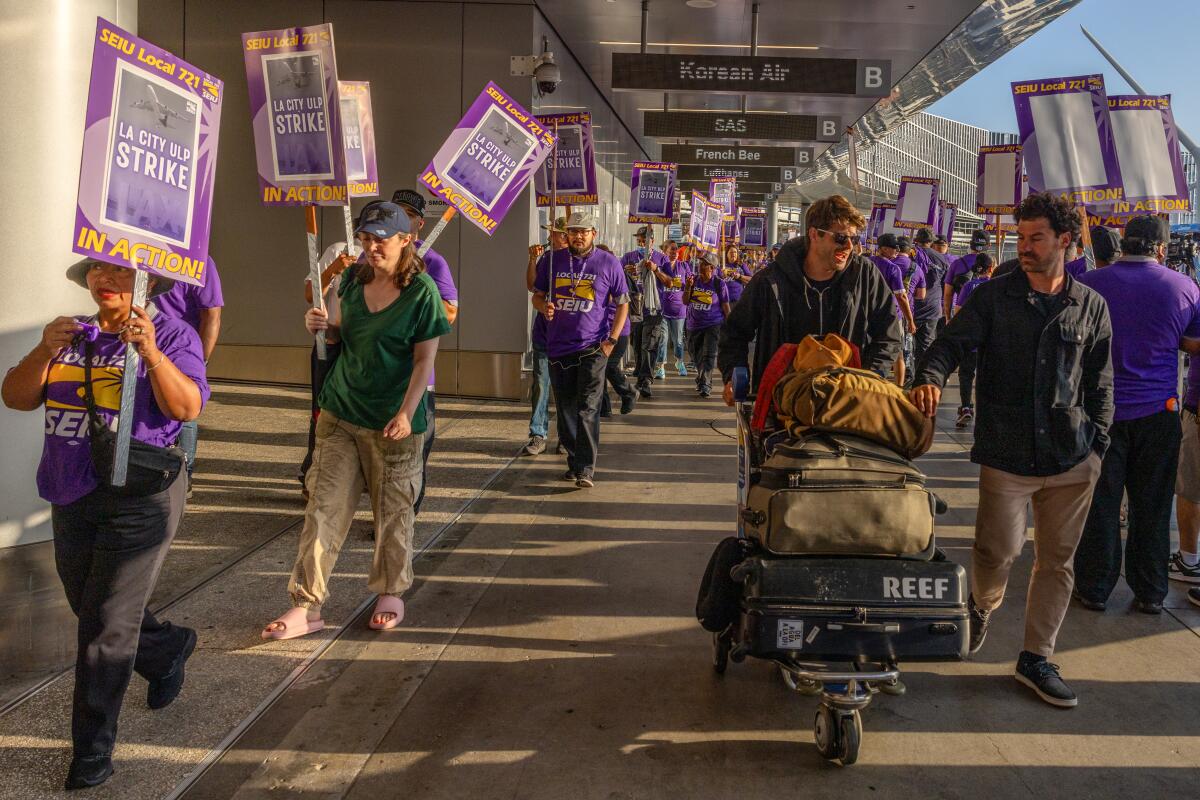
Thousands of Los Angeles city workers hit the picket lines Tuesday for a massive one-day strike after union leaders accused the city of unfair labor practices, which Mayor Karen Bass and other officials denied.
At City Hall, hundreds of mechanics, gardners, trash haulers and other city workers — many in uniform — gathered at the steps blowing sound makers, clanking cow bells and chanting. At Los Angeles International Airport, which employs at least 1,000 union members, dozens of mechanics and custodians were marching before dawn. By 7:30 a.m., the crowd had grown to about 100.
“L.A. city you’re no good,” the workers, wearing purple union T-shirts, chanted as travelers wheeled their suitcases by. “Treat your workers like you should.”
Service Employees International Union Local 721, which represents 7,000 city workers, began the strike at 12:01 a.m. — the first major walkout by Los Angeles city government workers in decades.
The strike brought lifeguards, traffic officers, airport custodians, sanitation workers and others to picket lines at the airport, City Hall and other locations.
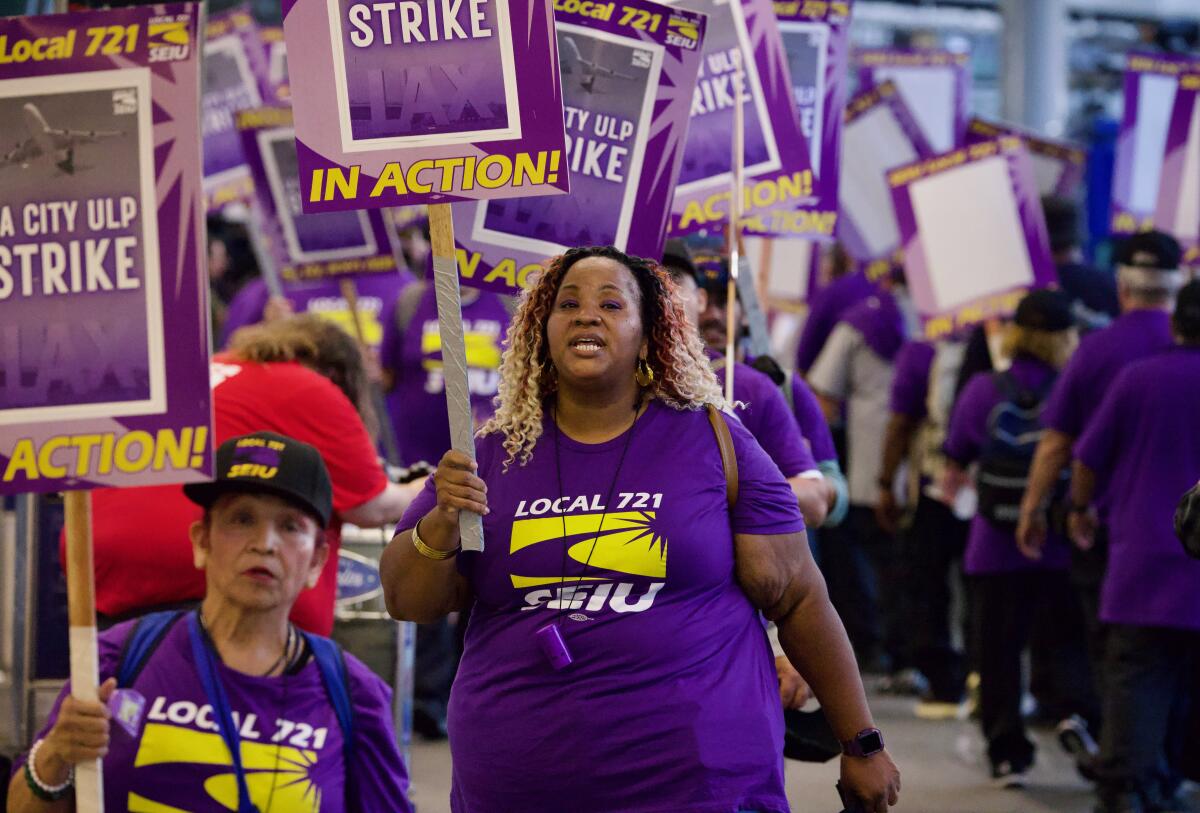
SEIU Local 721 President David Green said members are frustrated with the large number of vacancies within city agencies that have forced employees to work long hours.
“It’s more work for less money,” said Ana Altamirano, a 60-year-old airport custodian.
Altamirano, who works the graveyard shift, normally scrubs toilets and polishes floors in the terminals.
The one-day walkout, staged by SEIU Local 721, is expected to trigger the closure of animal shelters and at least some swimming pools and delay trash pickup until later in the week.
She came out to strike, she said, because she and her colleagues have seen their workload double since COVID-19 arrived. During the pandemic, when the airport was nearly empty, custodians were asked to cover more terrain across the airport’s terminals. As travelers poured back in as the pandemic ebbed, there were no longer enough custodians to keep the terminals tidy, she said.
Airport custodian Hilda Sotelo, 49, said the sprawling terminals once had double the cleaning staff. Last year, 66 million passengers made their way through the airport — the most since the pandemic.
“There’s not enough time to do” the work, said Sotelo, who has been employed by the city for two decades.
Sotelo said she and her colleagues are stressed scrubbing bathroom after bathroom. When they go on break, she said, passengers hail them for directions or other information.
“We are doing the work of three people,” she said.
The workforce shrank during the pandemic as city leaders, at the urging of SEIU Local 721 and other unions, reached an agreement to pay eligible city employees up to $80,000 to retire.
The deal, which was expected to result in the departure of more than 1,000 workers, was viewed as a cost-cutting measure that would help the city ride out the financial crisis brought on by COVID-19. City leaders also planned to reduce salaries of remaining employees by 10%.
Workers protesting Tuesday said their wages no longer kept up with the cost of living. Joe Martinez, a 52-year-old construction equipment service worker at LAX, said his commute to work from West Covina can take more than 90 minutes because he can’t afford a home in Los Angeles. He said he makes in the mid-$60,000s.
He counts himself lucky. Many of his colleagues live even farther away, in suburbs such as Moreno Valley.
“We want to get respect from the city to go back to the bargaining table,” said Martinez, who has worked for the city for eight years. “Our biggest thing is cost of living.”
The union is operating under a one-year salary agreement that ends in December, which has provided members a 3% pay increase and a one-time bonus equal to 5% of a worker’s annual salary.
Los Angeles city lifeguards, traffic officers, airport custodians, engineers and sanitation workers will be among those on the picket lines Tuesday.
Bass has pledged the city would not shut down for the one-day strike. Libraries, preschools and day-care facilities operated by the city are expected to be open as usual. The L.A. Zoo said it would operate normally. Firefighters and police officers will also continue as usual as will city-offered homeless and housing services.
But others services were being disrupted: Trash in most cases wasn’t being picked up, worse traffic congestion than usual was expected at big events, and city animal shelters were closed, along with at least some city pools. The union said it expected about 300 lifeguards working at pools across the city to strike.
At the Westwood Recreation Center, residents in flip flops who arrived before 8:30 a.m. found the doors locked and a “Pool closed today” sign on the door. Many said it was the first they had heard about the closure.
Asari Prado, 25, was hoping to get a few laps before work. While she had heard about workers going on strike, she said she didn’t expect it to affect her local pool.
“It sucks, but I get it. They have to do what they have to do to get paid a living wage,” she said. “I’m with them.”
Los Angeles World Airports warned travelers to leave extra time coming and going from LAX. Dae Levine, a spokesperson for L.A. World Airports, said the airport is working to ensure “operations will continue as close to normal as possible.” Airport security will be staffed as normal. The union has given LAX security workers permission to cross the picket line.
As of Tuesday morning, the march caused little disruption inside the airport as travelers approached the ticketing counters at the international terminal. Traffic in the infamously crowded horseshoe drop-off areas continued trickling by. Drivers coming and going occasionally honked in solidarity.
Devonte Butler, a 33-year-old maintenance and construction worker at LAX and father of two, said he’s frustrated with work days that can stretch as long as 12 hours.
“We are understaffed and overworked,” he added. “We are working around the clock to catch up.”
Times staff writer David Zahniser contributed to this report.
More to Read
Sign up for Essential California
The most important California stories and recommendations in your inbox every morning.
You may occasionally receive promotional content from the Los Angeles Times.
